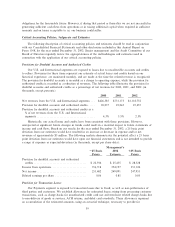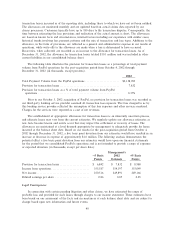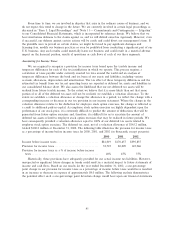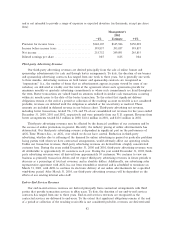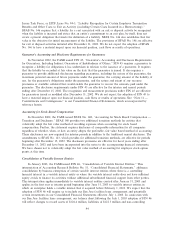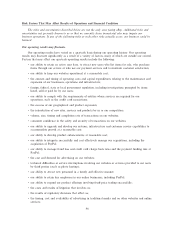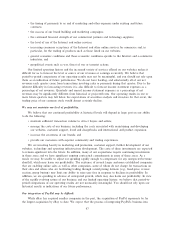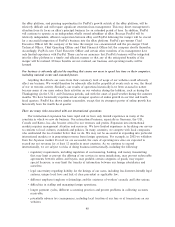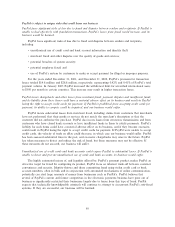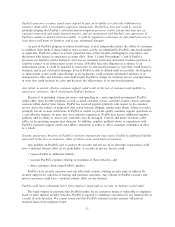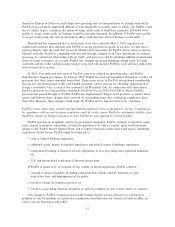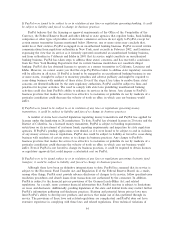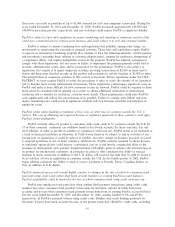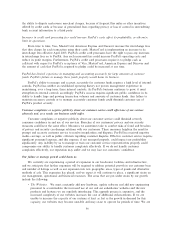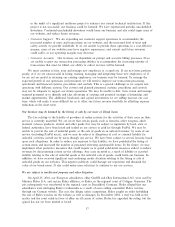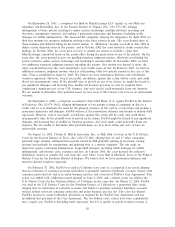eBay 2002 Annual Report Download - page 51
Download and view the complete annual report
Please find page 51 of the 2002 eBay annual report below. You can navigate through the pages in the report by either clicking on the pages listed below, or by using the keyword search tool below to find specific information within the annual report.‚ higher telecommunications and Internet service provider costs;
‚ strong local competitors;
‚ more stringent consumer and data protection laws;
‚ cultural ambivalence to, or non-acceptance of, online trading;
‚ seasonal reductions in business activity;
‚ expenses associated with localizing our products, including oÅering customers the ability to transact
business in the local currency;
‚ laws and business practices that favor local competitors;
‚ proÑt repatriation restrictions, foreign currency exchange restrictions and exchange rate Öuctuations;
‚ changes in a speciÑc country's or region's political or economic conditions; and
‚ diÅering intellectual property laws.
Some of these factors may cause our international costs to exceed our domestic costs of doing
business. To the extent we expand our international operations and have additional portions of our
international revenues denominated in foreign currencies, we also could become subject to increased
diÇculties in collecting accounts receivable and risks relating to foreign currency exchange rate
Öuctuations.
We intend to expand PayPal's services internationally. Both we and PayPal have limited experience
with the payments business outside of the U.S. In addition to all of the factors listed above, we expect that
successful international expansion of PayPal's business will require successful integration with local
payment providers (including banks, credit and debit card associations, electronic fund transfer systems
and others) and in some countries may require a close commercial relationship with a local bank. We do
not know if these or other factors may prevent, delay or limit PayPal's expansion or reduce its proÑtability.
Any limitation on our ability to expand PayPal internationally could harm our business.
Our business may be subject to sales and other taxes.
We do not collect sales or other similar taxes on goods or services sold by users through our services.
One or more states or any foreign country may seek to impose value-added taxes, or VAT, or sales or use
tax collection or record-keeping obligations on companies such as ours that engage in or facilitate online
commerce. Such taxes could be imposed if, for example, we were ever deemed to be an auctioneer or the
agent of our sellers. Several proposals have been made at the state and local level that would impose
additional taxes on the sale of goods and services through the Internet. These proposals, if adopted, could
substantially impair the growth of e-commerce, and could diminish our opportunity to derive Ñnancial
beneÑt from our activities. In 1998, the U.S. federal government enacted legislation prohibiting states or
other local authorities from imposing new taxes on Internet commerce for a period of three years, which
has been extended through November 1, 2003. This moratorium does not prohibit states or the Internal
Revenue Service from collecting taxes on our income, if any, or from collecting taxes that are due under
existing tax rules. New regulations in the European Union relating to the collection of VAT on digital
services will require us to collect and remit VAT on our own fees beginning in July 2003. We intend to
work with relevant tax authorities to clarify our obligations under these regulations and to change our
software to permit the billing of these taxes. We expect substantial ongoing costs associated with
complying with the VAT rules throughout Europe and the increased cost to our users may reduce their
activity on our websites. Both of these eÅects could adversely aÅect our business. A successful assertion by
one or more states or any foreign country that we should collect sales or other taxes on the exchange of
merchandise on our system would harm our business.
49


